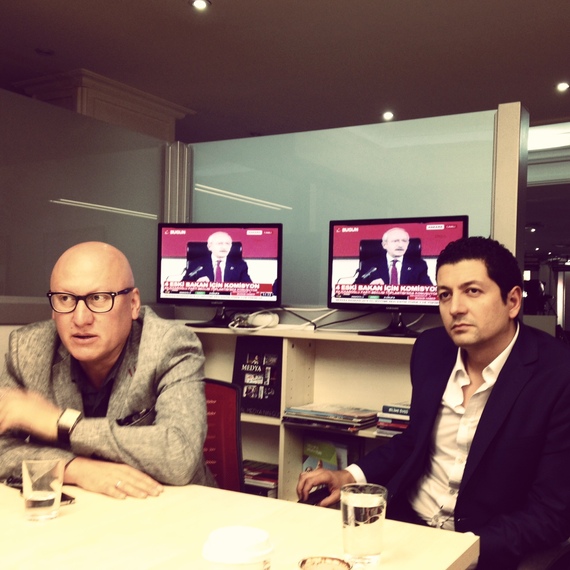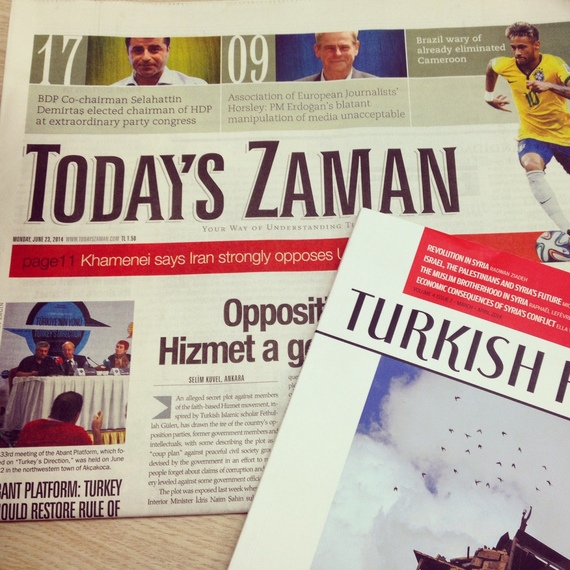With only one month before Turkey's Presidential Election, international media coverage of Turkey is needed now more than ever before as Turkish media companies and journalists continue to face extreme pressure from Prime Minister Recep Tayyip Erdoğan to censor coverage of political and international events.
"We are accused of being traitors and agents," said Bugün TV anchor, Erkam Tufan Aytav, during a June interview translated from Turkish to English.
Turkey, which was once a promising candidate for the European Union, currently appears to be turning away from democratic values and toward authoritarian rule.
Erdoğan announced his intention to run for president as his three terms as prime minister are up. Being president would give him a greater chance to consolidate his power and expand his role. As the New York Times reports, "Mr. Erdogan has also sought to change the Turkish Constitution to create a government dominated by the presidency. So far, he has not been able to muster the necessary support, but many expect him to try again. And his advisers are already laying the groundwork for a much more powerful presidency under Mr. Erdogan."
Erdoğan is posed to run against Ekmeleddin Ihsanoglu, who was nominated by the opposition parties, CHP and MHP, as well as a candidate from the pro-Kurdish party, Selahattin Demirtas. While the efficacy of these candidates to win a majority of the vote is debated, do not expect an open, televised, American-style election. Erdoğan has already shown that he will not engage with any media outlets that disagree with him. When he has done public appearances or panels in Turkey, he tends to only work with sympathetic journalists with pre-screened softball questions.
Instead of focusing on the major domestic and international problems facing Turkey, Erdoğan and members of his political party, AKP, seem more focused on shutting down media criticism.
For example, if Erdoğan sees someone on TV from outside his political party, he has been known to call the owners of those media stations and ask them to change the course of their coverage, which has been confirmed by leaked phone recordings and transcripts. This has led many media organizations to self-censorship; guests from opposing political parties are pulled off the air and coverage of current events in Turkey are spun to agree with Erdoğan's point of view.
According to conversations with several journalists in Turkey, the Ministry of Finance has blocked the renewal of broadcast licenses and put pressure on advertisers to pull ads from outlets that disagree with the government's point of view.
"We have the highest number of journalists in jail," said CHP Parliamentary member, Dr. Aykan Erdemir, a social democrat. "That's not a score we are proud of."
Freedom House now ranks the Turkish press as "not free," which puts Turkey alongside the likes of North Korea and Venezuela.
Only a small handful of media outlets -- Zaman, Todays Zaman, Bugun TV, Kanalturk and a few others -- continue to try and report about the political corruption and domestic challenges facing Turkey despite the pressure and repeated court rulings to ban media coverage of critical events in Turkey, including press bans on the diplomat hostage crisis in Iraq and the December 17 corruption case.
But even for those journalists who want to report the truth, they have good reason to be cautious. As the international editor of Zaman, Mustafa Edib Yılmaz, said "Being brave is one thing. Being smart is another. If you do too many brave things at once, you risk being able to tell the truth tomorrow."
In other words, don't make yourself an open target.
Zaman is a relatively new player in the Turkish media scene. Since Zaman launched in 1986, it has become one of the top newspapers in Turkey -- demonstrating public demand for non-government media outlets. Zaman also publishes an English version of its newspaper titled Todays Zaman. Though Todays Zaman is not yet profitable for the company, international editor of Zaman, Mustafa Edib Yılmaz said "publishing in English is the best way to reach out to the world" and that "being understood accurately is very important."
On July 10, Erdoğan filed another lawsuit against Todays Zaman editor-in-chief because Erdoğan claims he was insulted by comments posted by the editor on Twitter. Erdoğan has a digital army of thousands who go after those on social networks who disagree with him or the AKP.
Earlier this year, Twitter, YouTube and Google+ were banned in Turkey as they have become alternative outlets for information leaks. These bans were dropped after proving to be ineffective, but still Erdoğan continues to try and punish those who use the social networks to share information about his corrupt regime.
American media and international outlets need to cover what is happening to the press in Turkey in the lead up to the presidential election on August 10. With so many Turkish journalists who have been fired, international media outlets should try to hire these journalists and allow them to continue reporting from the ground.
"International coverage of these events would be of great benefit," said Kanaltürk'te TV news anchor, Turan Görüryılmaz. "People who can speak elsewhere should speak elsewhere."
A free press is critical to ensure that the Turkish people understand the corruption going on with the government and the judicial system before they elect a new President on August 10. If Erdoğan is elected President, his rule of Turkey will likely become more oppressive and divisive. With the pressure stacking up against Turkish media companies, it is up to the global media corps to hold Erdoğan accountable and make sure Turkey continues to be a democratic ally to The United States and Europe.

